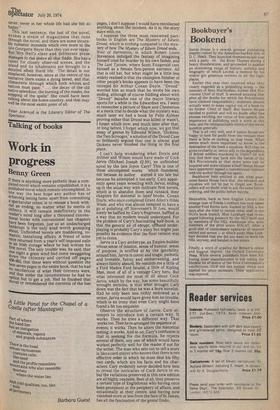Bookbuyer's
Bookend
Saxon House is a newish general publishing imprint owned by the American-backed firm of D. C. Heath. They launched themselves last year with a party On the River Thames during a heavy thunderstorm, and proceeded CO publish an interesting range of history, politics and biography of which Levine, a memoir by his widow got generous reviews in all the right places.
Earlier this year they received what they clearly regarded as a publishing scoop — the memoirs of Sean MacStiofain, former IRA Provisional Chief of Staff. It seemed amazing that after all the deaths for which the Provisionals have claimed responsibility, someone should actually want to make capital out of a book by its former Chief of Staff. But Saxon House decided to publish and will no doubt offer fine phrases extolling the virtue of free speech, the importance of publishing such a work at this time, and the unimpeachable ethics of the whole question generally.
That is all very well, and if Saxon House are happy to look for profit from the venture then there is little or nothing to stop them. What seems much more important to know is the destination of the book's royalties. Will they be given to charity or, better still, to the dependents of British soldiers murdered in Ulster? Or will they find their way back into the hands of the IRA Provisionals so that more arms can be acquired and more citizens killed? Saxon House have apparently signed a conventional r:ontract with the author through his agent.
Bookbuyer feels entitled to ask what guarantee Saxon House have that the advance and royalties will not be put to illegal use. Booksellers will no doubt wish to ask the same before ordering, and the public before buying.
Meanwhile, back at New English Library the strange case of Frieda Lockhart has now taken another Fred Karno turn. Sacked by NEL a few days after she tried to recruit other staff to the NUJ's book branch. Miss Lockhart was re-engaged following pressure by the NUJ itself and by members of the NEL warehouse who were members of the print union SOGAT. After a good deal of unnecessary upheaval all seemed settled and serene — at which point Miss Lockhart decided that she did not want to work for NEL anyway, and handed in her notice.
Finally, a word of sypathy for Britainya oldest and biggest imprint, the Oxford University Press. While several publishers have been following other manufacturers in not taking the blindest bit of notice of the Price Commission's restfictions, OUP did the honest thing and applied for price increases. Their application was rejected.


































 Previous page
Previous page